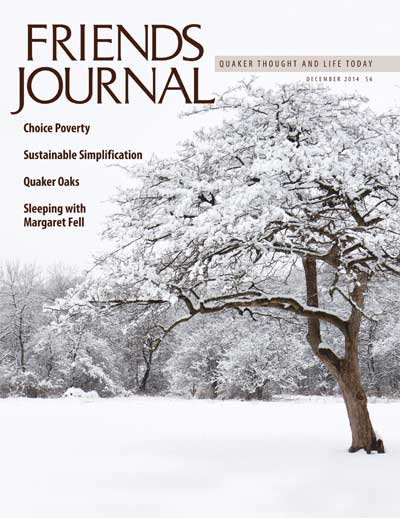 Over the years, many people have expressed to me an intention to simplify their lives. In nearly every case, those intentions appeared to be grounded in either a litany of “shoulds” or a reluctant resignation to making a sacrifice to assuage an untenable level of ethical dissonance. In my experience, neither impetus is sustainable.
Over the years, many people have expressed to me an intention to simplify their lives. In nearly every case, those intentions appeared to be grounded in either a litany of “shoulds” or a reluctant resignation to making a sacrifice to assuage an untenable level of ethical dissonance. In my experience, neither impetus is sustainable.
Guilt has always struck me as a useless emotion. It does nothing to help the person or situation about which we’re feeling guilty, and it makes us feel miserable. Acting proactively to preclude guilt benefits others and avoids misery for the one who acts. As soon as I hear someone say the word “should,” I instinctively flinch, sensing that the words that follow evince a reluctance in that person’s spirit for the action being considered. In most cases, either dithering postpones the action, or a withering spirit saps the verve of the well-intentioned soul. In both instances, a long-term sustainability is lacking.
When I speak to groups about downward mobility, someone usually commends me for my willingness to sacrifice. Once again, I flinch. It’s no sacrifice to eschew something you never wanted in the first place. Unless one’s heart embraces a simpler lifestyle, it will not be sustainable. And unless we’re religious flagellants, our hearts won’t desire simplicity as long as we consider it a sacrifice. On occasion, I sense a willingness by some to engage in temporary sacrifice to buy time, e.g. to ride a bicycle until a “smart,” clean car is invented. I, myself, put no faith in technological fixes, observing that each new technology ratchets up global wealth disparities and is nearly always less environmentally sustainable than the one it replaced. “Smart” devices usually result in increased use of the item by its owners, who now feel less guilt over using it, thus canceling out any anticipated environmental improvement.
The environment, after all, is God’s creation, and I observe two distinct worldviews regarding it. One says: God’s creation is awesome, and with a little ingenuity, our technologies can make it even better. The other worldview says: God’s creation is awesome, and our attempts to alter it to our liking are not likely to result in improvements, so we’d best use our ingenuity to learn how to adapt to nature rather than attempting to adapt nature to our desires. I ascribe to the latter mindset, and I try to take my cues about how to live from Jesus’s lifestyle.
My faith tells me that Jesus had the capacity to choose any lot in life that he wished. He could have chosen to be wealthy and magnanimously bestow his riches on others. He didn’t. Fully conscious of his endless options, Jesus chose to be homeless, poor, and unencumbered by the power trappings of the culture he so roundly rejected. And he beckons us to join him, not as bystanders observing from afar but as eager members of a band of outcasts. It’s as if Jesus implores us to viscerally experience with him the benefits of voluntary poverty. His words of invitation and opportunity to those he encountered were “follow me,” not “worship me” or “put me on a pedestal”—a polite way to dismiss his behavior as hopelessly inimitable. (The Catholic Worker co-founder Dorothy Day once responded to admirers who wanted her canonized a saint, “Don’t write me off so easily.”) Of course, none of us is capable of being completely like Jesus, but his exhortation to “follow me” encourages us to do our best and come as close as we can, asking for God’s grace and guidance to augment our feeble and halting efforts.
Jesus wants the best for his followers, not the inferior and soul-eroding “best” that our culture panders. He wants us to have a lean and robust faith, not the flabby faith and vacuous values of a superficial life. The path that Jesus modeled for us is not a hair shirt of misery. He embraced voluntary poverty because he knew it to be the best sustenance for a healthy soul. When something is best, it’s no sacrifice to embrace it, and no “shoulds” are needed to prompt us to the task.
So how am I doing? Not very well, I’m afraid. When my wife and I wed in 1971 and set out to center our lives on pursuing global equity (having observed that a large percentage of the world’s problems seem to stem ultimately from global wealth disparity), we knew our path would be considered societally insane by mainstream U.S. culture. But, embracing the concept of the priesthood of all believers, we felt the Christian path was the best for our souls. When Mary Ann died in 2007, I accepted the challenge to live for both of us and attempted to venture deeper into the global equity realm. So I downsized further, and for the past five years have lived on $5 a day for all my expenses, giving away the rest of my income.
That looks pretty good from the perspective of an overdeveloped country like the United States, but in the global context it’s unimpressive. The World Bank says over half of the world’s people live on less than $2 per day. My $5 per day is princely. Moreover, my $25,000 per year income ranks me in the global elite 10 percent, according to the World Bank. And for the last 30 years, in order to avoid paying federal income tax (since about half of it funds militarism, regardless of who is in the White House), I’ve deposited money into retirement accounts amounting to enough to cover all my living expenses for over a century! (To avoid federal tax, I will postpone giving this money away—to projects that promote global equity—until I am 70-and-a-half in 2018.) So despite my lofty aspirations, I seem to have a pecuniary penchant.
Oh well, should I give up? Is following the Christian path impossible? No, my dismal efforts just manifest my need for God’s guidance. I may be far from my global equity goals, but I can always strive to come closer. And the closer I can get—with God’s help—the more I can experience the joy of living at least somewhat in solidarity with the global majority, my siblings in Christ.
Finally, in pursuit of communion with Jesus in his life of voluntary poverty, I’ve come up with a high maintenance disciple’s confessional prayer to try to keep me on the Christian path. I share it here in hopes it might be of use to any others who seek a similar journey.
Dear Lord, Great Spirit of Goodness and Love,
I admit to being a poor excuse for a Christian and a drain on your patience to keep me on the Christian path. But believing your font of goodness and love to be infinite, I ask that your spirit guide me in a 3D manner. Please gift me with discernment to clearly know your will, desire to partner with you to implement your will in this world, and discipline not to be diverted or distracted from a faithful focus on living out the values embodied in your spirit. Please transform my self-absorbed existence and remake me into a vibrant conduit of your goodness and love, free from spiritual plaque, selfish concerns, and material encumbrances. Finally, Lord, when my days on this earth are over, please inspire me to have lived a meaningful life centered on things that really matter rather than the baubles of our self-indulgent, secular culture, so I may exit this life with a minimum of regrets. Amen.




Agreed.
Simplifying ones’ life should not be about sacrifice and guilt and nay-saying; but rather about the joy of grounding ones’ whole being in the Light and Love which is Everything.
We live simple lives so that we can hear “that still, small Voice” and be our calling.
Thank you for putting your persuasive story out there Chuck. I just want to remind you and your readers that it is not necessary to criticize the simplicity approaches taken by others in order to offer your own. More than half of the cars in our Friend’s Meeting parking lot are fully electric or hybrids. I do agree that some people who adopt technological mitigations may, as a result, over-use them to the point of canceling their benefits, but I believe those are rare birds.
I believe that God loves us all and that the resources we need were put here so that we might become all that we can be. If we suddenly lost our ability to